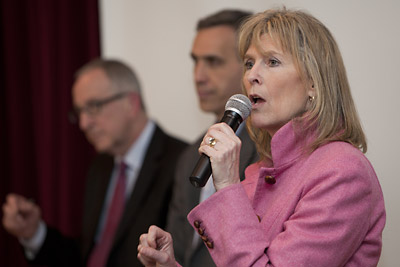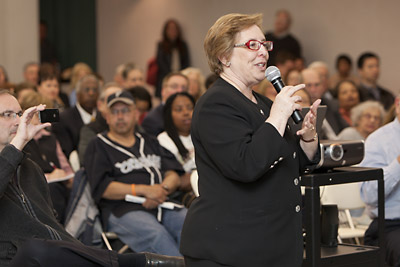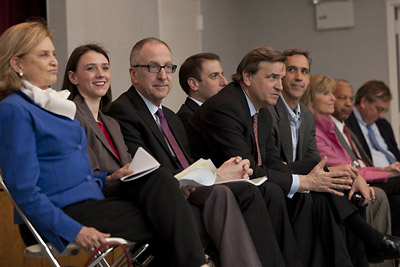Cornell encourages input from Roosevelt Islanders
By David Keating



Cornell is committed to working with local community groups on Roosevelt Island as the CornellNYC Tech campus takes shape, said President David Skorton and other university officials before a standing-room-only crowd of more than 200 residents at the first town hall meeting on the new campus on Roosevelt Island, April 5.
Setting the tone for the evening, Skorton noted in his opening remarks that: "We have few answers to offer because we are at the very beginning of the process and most decisions have yet to be considered. We come tonight to begin to work with you and to listen to you."
U.S. Rep. Carolyn Maloney (D-14th) began the evening by expressing her excitement for the "game-changing" proposal offered by the city and Cornell. Maloney represents the Upper East Side, where Weill Cornell Medical College resides, and Roosevelt Island.
Jessica Lappin, East Side City Council member, who also represents the Upper East Side and Roosevelt Island, followed Maloney, echoing her support of the city's Applied Sciences initiative and Cornell's proposed campus.
Robert Steel, deputy mayor for economic development, and Seth Pinsky, president of the New York City Economic Development Corp., the two officials in New York City Mayor Michael Bloomberg's administration most responsible for the initiative and for selecting Cornell, also conveyed their enthusiasm for Cornell's proposal and its benefit to New York City in general and Roosevelt Island in particular.
Micah Kellner, state assemblyman for Roosevelt Island, introduced Skorton and echoed support for the Cornell initiative and its benefits to Roosevelt Island and its residents.
Skorton discussed the campus's vision and goals for transforming New York City's tech sector and economy. Dan Huttenlocher, vice provost and founding dean of CornellNYC Tech, explained the academic curricula and commercialization vision of the campus. He emphasized that a focus of the campus is to create jobs for the city -- some 30,000 to 120,000 permanent jobs over the next three decades -- and to connect with the city's tech sectors, including advertising/media, health care, insurance and the built environment.
Cathy Dove, vice president of CornellNYC Tech, focused on the campus's physical plan. She said that right now the development team was spending a lot of time working on a set of principles and a high level campus plan that would guide building and development for the decades to come.
Dove and Huttenlocher noted that many plans were still under discussion, including selecting an architect for the first building, defining the campus layout, determining energy and sustainability approaches, and finalizing the timing of construction for several of the facilities.
During the question-and-answer session, Dove and Skorton emphasized that Cornell was interested in community input throughout the process.
The Cornell administrators said that they marked the town hall meeting as just the beginning of the dialogue that will ensue between the city, Cornell and Roosevelt Island residents.
Cornell is gearing up to build an over 10-acre tech campus on Roosevelt Island after winning New York City's tech campus contest, which was announced in December. Construction on Roosevelt Island is expected to begin with demolition of the existing buildings on the site in 2014, with the new campus opening in 2017. Initially the campus will have several hundred students and faculty and staff. Over 30 years, the population will grow to approximately 2,000 graduate students, 250 staff, almost 300 faculty and 2 million square feet of space. Plans for a temporary campus location are under way so activities can launch in the fall.
David Keating is a communications specialist in Cornell's public affairs office.
Get Cornell news delivered right to your inbox.
Subscribe